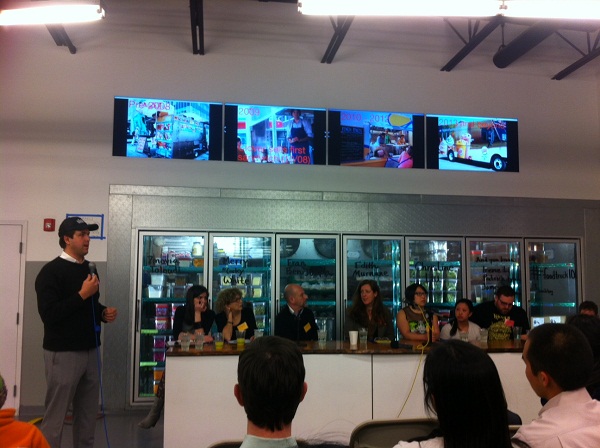The Future of Food Trucks: What You Missed at Clover’s Food Truck 101
 The panel last night, L-R: Ayr Muir (Founder, Clover Food Lab); Dr. Zenovia Toloudi (Artist-in-residence, Mass College of Art, MIT); Dr. Merry “Corky” White (Author, Culinary Anthropologist, Boston University); Dr. Eran Ben-Joseph (Author, “Re-thinking A Lot: The Design and Culture of Parking”); Edith Murnane (Director of Food Initiatives, City of Boston); Christine Liu (America’s Test Kitchen, Founder, Boston Food Truck Festival); Irene Li (Mei Mei Street Kitchen); James DiSabatino (Roxy’s Grilled Cheese); Patrick Lynch (Bon Me). Photo by Brennan Carley.
The panel last night, L-R: Ayr Muir (Founder, Clover Food Lab); Dr. Zenovia Toloudi (Artist-in-residence, Mass College of Art, MIT); Dr. Merry “Corky” White (Author, Culinary Anthropologist, Boston University); Dr. Eran Ben-Joseph (Author, “Re-thinking A Lot: The Design and Culture of Parking”); Edith Murnane (Director of Food Initiatives, City of Boston); Christine Liu (America’s Test Kitchen, Founder, Boston Food Truck Festival); Irene Li (Mei Mei Street Kitchen); James DiSabatino (Roxy’s Grilled Cheese); Patrick Lynch (Bon Me). Photo by Brennan Carley.
Last night, Boston food truck elite convened at the Clover HUB Kitchen in Inman Square for the city’s second annual Food Truck 101. The conference focused on the creation of a truck from scratch, the economics behind running and sustaining these mobile businesses, and the utilization of social media in an evolving industry. The evening culminated with a panel discussion featuring a City of Boston official, a culinary anthropologist, a member of America’s Test Kitchen, and an urban planner. Below, find the major takeaways from the lively conference.
If you source it right, pork is a special occasion product.
Irene and Mei Li, the owners of the popular Mei Mei Street Kitchen, focused their discussion on issues of sustainability, menu turnover, and reliability, and how complicated dishes can affect truck flow. Pointing to pork as one of their most popular dish components, the ladies noted that it’s more of a “special occasion meat on our menu” because of the high prices. The sisters taught themselves how to butcher whole pigs—purchased biweekly in 200-250 pound increments from the nearby John Crow Farm—by watching YouTube videos. “I came down one morning and was like, oh my God, it’s a Dexter episode,” Irene joked about finding a half-butchered pig on her mother’s kitchen table.
Dumpling folding is hard.
The Li sisters also pointed to the difficulties of running an Asian food truck with an audience expecting dumplings as a regular menu staple. “It got us thinking about plans versus reality,” said Irene, who mentioned that the family was unwilling to compromise with store-bought dumpling wrappers. Now, Mei Mei features the popular doughy dish on the menu roughly half of the time, having hired a dedicated folder who can throw together 60 to 70 dumplings per prep. By cooking the dumplings either in their truck’s steamer or fryer, Mei noted a massively improved truck flow.
Building a truck from scratch takes time.
Patrick Lynch, founder of Bon Me—which recently opened a brick and mortar location in Cambridge—spoke about the logistics of starting a truck from scratch, which for him meant extensive research, price checking, and reviewing lots of quotes. Lynch also spoke about the lessons he learned from the first truck and how they affected the design of the second. “On the Yellow [the first] truck, we had 150 people in mind per service,” said Blue truck manager Emma. “But in Dewey Square, we do 300 plus per service.” The key takeaway in Lynch’s eyes? “Pick a builder you trust,” he said. Bon Me’s builder is Creative Mobile Services in Connecticut, “a hassle when we have to drive it back for maintenance, but a good partner all the way.”
Be ready to front some serious cash.
The most eagerly anticipated talk came courtesy of John Lee, Clover’s “money guy,” who walked the packed room through all the expenses incurred before any food truck makes its first sale. While he noted relatively low barriers to entry, Lee estimated that the up-front cash required could range from 65 to 200K. Rattling off fees—cost of the truck, small wares, licensing, fuel, training, insurance pre-pay, rent pre-payment, and miscellaneous other costs—Lee’s talk was meant to warn rather than deter listeners eager to strike out on their own. “It’s a much lower cost than it would be to set up a restaurant,” he told the crowd, “but you have to have a budget, and you have to get friendly with your P&L statements.” Lee also promised that things could go well, pointing to catering, low food and labor costs, and high prices like those the Sweet Truck in New York City charges its customers (including $5 mini-cupcakes). “You ever pay $5 for a cupcake? That’ll make you some money,” he laughed.
“Generation C” loves grilled cheese.
James DiSabatino, owner and operator of Roxy’s Grilled Cheese, walked the audience through the ways a food truck should properly interact with its fans via social media: “Don’t half ass it.” Citing Los Angeles’ Ray Choi (Kogi founder) as a food truck and social media innovator, DiSabatino launched into a case study of how Roxy’s utilized Twitter and Facebook as a “get to know you tool” before opening in the summer of 2010. Calling social media “a new frontier in audience engagement,” he expressed his love of the medium as a customer service tool, allowing the truck to solve any problems that may arise in real time. DiSabatino also mentioned a new subdivision among potential customers called “Generation C,” defined not by age but by behavior. “They meet on the internet and share content in new ways. That’s what we as food trucks are looking to do.” Excitingly, DiSabatino briefly hinted at a plan to integrate Spotify playlists with its social media plan. “We play music on the truck, whether it’s allowed or not, so we’d like to start sharing that with fans.”
Operators care about the locals.
All of the conference speakers placed a definitive emphasis on the importance of the customer and the city of Boston itself in their ultimate missions. “It’s important to build a brand, yeah, but it’s great to see the way that people are looking at food differently across the board,” DiSabatino said, claiming that food trucks “took the fear factor away from eating high quality foods.” Irene Li emphasized the importance of menu reliability for a regular crowd, in that “dishes like the Double Awesome [a scallion pancake wrapped egg dish with local herbs] will always be there for customers even if our specials are sold out. That’s important to us.” Mei spoke extensively about sourcing locally, both of its constraints and inspiration. “The kale salad is a truck special that is missing in the winter months because we just can’t get kale locally,” she said. “We’re unwilling to compromise on something like that.”
The Future Of Food Trucks
The final panel featured a who’s who of Boston movers and shakers in the food truck industry. Edith Murnane, Director of Food Initiatives in the City of Boston, spoke about how Mayor Menino stumbled upon Clover in 2010 and decided that he liked what he saw. “The three reasons he saw for allowing food trucks into Boston were to incubate a small business by helping it grow, to use them as a platform to talk about and provide healthier food, and as a way of activating Boston’s neighborhoods,” she said.
Boston University professor and culinary anthropologist Dr. Merry “Corky” White agreed, chiming in that “food trucks and carts have always been part of an urban scene. There’s an appeal of being with people you do know, and people you don’t know to eat. You’re doing things you share in common.” City planner Dr. Eran Ben-Joseph, the author of a book chronicling the history of parking lots entitled Re-thinking A Lot: The Design and Culture of Parking, was quick to emphasize the role that trucks had on the environment they populated. “Food trucks are the greatest tool to test the urban scene,” he mused, “because we have to ask ourselves: do we direct them, or do we let them happen naturally?”
Artist-in-Residence at Mass College of Art and MIT, Dr. Zenovia Toloudi, told the crowd that there was an observable link between the locations of the food trucks themselves and their popularity. “It’s not an accident that all these people at MIT don’t mind waiting in an hour long line to eat informally outdoors,” she joked. “They spend all day at their computers, but food trucks let us remember how important it is to experience the outdoors.”
Much of the conversation revolved around Boston-centric issues, including zoning permits, community activation, and the changing environment that resulted from the emergence of food trucks just a few short years ago. Christine Liu, Online Managing Editor for America’s Test Kitchen and founder of the Boston Food Truck Festival, agreed that food trucks had changed the way Americans eat. “They’ve grown in numbers, and now they’re part of the mass culture. There was one of the cover of Costco Magazine. You can’t take it away, it’s a part of our everyday life now.”
When moderator Ayr Muir, founder of Clover Food Lab, asked the panel members to speculate about where food trucks would stand in 2020, there was a definite sense of conclusiveness. “Food trucks can fill space and social gaps,” White said, noting that two years ago “north Cambridge used to be considered ‘above the croissant line.’ Now that there’s more of an escalating demand for them, I see more, and more various, trucks.”
“There’s a Boston City Hall on wheels already, so yes, I think we’ll see food trucks in more interesting spaces and niche spots where we’ll be able to create a space and energy,” said Murnane.
Ben-Joseph spoke for the whole room with his final remarks: “if there’s food that people like to eat,” he said with a smile on his face as audience members stopped munching their dinner to listen, “there will always be food trucks.”
For more online food coverage, find us on Twitter at @ChowderBoston


